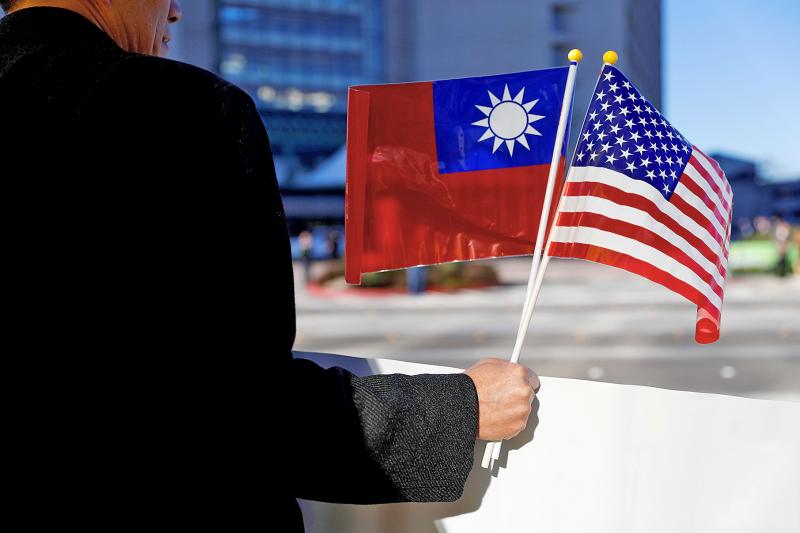Long-term polling data show that a majority of Taiwanese feel that the Taiwan-US relationship is more important than the Taiwan-China relationship, National Chengchi University professor Tsai Chia-hung (蔡佳泓) told a panel on national security and the state of Taiwan-China relations held yesterday by the Democratic Progressive Party (DPP).
The data, compiled by the university’s Election Study Center, showed that although most Taiwanese feel that China has more influence in the international community, developing closer ties with the US is more important to Taiwan’s future, Tsai said, adding that there was no large difference of opinion across age groups.
Study participants largely felt that ongoing US-China trade tensions highlight the importance of Taiwan-US economic ties, he said.

Photo: Reuters
Tsai said that the number of members of the public aged 20 to 35 who self-identify as “Taiwanese,” as opposed to “Chinese,” has been growing since 2008, with 80 percent identifying as Taiwanese in a study late last year.
“The number of those identifying as ‘Taiwanese’ and supporting independence has been growing over the past decade, regardless of what party is in power,” he said. “At least half of those aged 20 to 35 supported independence as of last year.”
In the most recent study, 39 percent of respondents aged 20 to 35 said China’s global influence was “very strong,” while only 8.5 percent said the US’ influence was “very strong.”
In the 36 to 50 age group, 33.5 percent said China’s influence was “strong” and 9.4 percent said the US’ influence was “strong,” while in the 51 to 65 age group, 31.4 percent said China’s influence was “very strong” and 16.6 percent said the US’ influence was “very strong,” the study showed.
Among those aged 66 or older, the numbers were more even, with 22.8 percent saying that China’s influence was “very strong” and 19.2 percent saying that the US’ influence was, it showed.
However, the numbers were almost the opposite when respondents were asked with which country Taiwan should prioritize relations, Tsai said.
In the 20 to 35 age group, 21.3 percent said that Taiwan-US relations were “very important,” while only 9 percent said that Taiwan-China relations were, it showed.
The numbers were almost identical across all age groups, Tsai said.
“Taiwanese generally are not interested in unification with China, but there is room for improvement in the relationship with the US,” he said. “The US could strengthen its influence if it begins to play a greater role in the region.”
Citing surveys from the Pew Research Center and other US organizations, DPP legislative caucus secretary-general Lo Chih-cheng (羅致政) told the panel that China’s global image has been worsening over the past several years.
This is mainly due to the growth of China’s national power and how that has manifested itself, as well as China’s influence over the internal affairs of other nations, he said.

An essay competition jointly organized by a local writing society and a publisher affiliated with the Chinese Communist Party (CCP) might have contravened the Act Governing Relations Between the People of the Taiwan Area and the Mainland Area (臺灣地區與大陸地區人民關係條例), the Mainland Affairs Council (MAC) said on Thursday. “In this case, the partner organization is clearly an agency under the CCP’s Fujian Provincial Committee,” MAC Deputy Minister and spokesperson Liang Wen-chieh (梁文傑) said at a news briefing in Taipei. “It also involves bringing Taiwanese students to China with all-expenses-paid arrangements to attend award ceremonies and camps,” Liang said. Those two “characteristics” are typically sufficient

A magnitude 5.9 earthquake that struck about 33km off the coast of Hualien City was the "main shock" in a series of quakes in the area, with aftershocks expected over the next three days, the Central Weather Administration (CWA) said yesterday. Prior to the magnitude 5.9 quake shaking most of Taiwan at 6:53pm yesterday, six other earthquakes stronger than a magnitude of 4, starting with a magnitude 5.5 quake at 6:09pm, occurred in the area. CWA Seismological Center Director Wu Chien-fu (吳健富) confirmed that the quakes were all part of the same series and that the magnitude 5.5 temblor was

The brilliant blue waters, thick foliage and bucolic atmosphere on this seemingly idyllic archipelago deep in the Pacific Ocean belie the key role it now plays in a titanic geopolitical struggle. Palau is again on the front line as China, and the US and its allies prepare their forces in an intensifying contest for control over the Asia-Pacific region. The democratic nation of just 17,000 people hosts US-controlled airstrips and soon-to-be-completed radar installations that the US military describes as “critical” to monitoring vast swathes of water and airspace. It is also a key piece of the second island chain, a string of

The Central Weather Administration has issued a heat alert for southeastern Taiwan, warning of temperatures as high as 36°C today, while alerting some coastal areas of strong winds later in the day. Kaohsiung’s Neimen District (內門) and Pingtung County’s Neipu Township (內埔) are under an orange heat alert, which warns of temperatures as high as 36°C for three consecutive days, the CWA said, citing southwest winds. The heat would also extend to Tainan’s Nansi (楠西) and Yujing (玉井) districts, as well as Pingtung’s Gaoshu (高樹), Yanpu (鹽埔) and Majia (瑪家) townships, it said, forecasting highs of up to 36°C in those areas